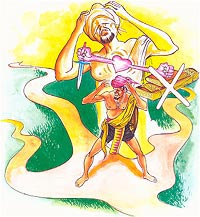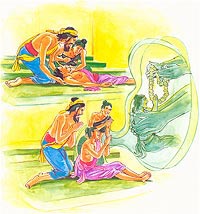

 |
Verse 33. The Wise Person Straightens The Mind
Explanation: In the Dhammapada there are several references to the craftsmanship of the fletcher. The Buddha seems to have observed the process through which a fletcher transforms an ordinary stick into an efficient arrow-shaft. The disciplining of the mind is seen as being a parallel process. In this stanza the Buddha says that the wise one straightens and steadies the vacillating mind that is difficult to guard, like a fletcher straightening an arrow-shaft. |
 |
Verse 34. The Fluttering Mind
Explanation: When making an effort to abandon the realm of Mara (evil), the mind begins to quiver like a fish taken out of the water and thrown on land. |
 |
Verse 35. Restrained Mind Leads To Happiness
Explanation: The mind is exceedingly subtle and is difficult to be seen. It attaches on whatever target it wishes. The wise guard the mind. The guarded mind brings bliss. |
 |
Verse 36. Protected Mind Leads To Happiness
Explanation: The mind moves about so fast it is difficult to get hold of it fully. It is swift. It has a way of focusing upon whatever it likes. It is good and of immense advantage to tame the mind. The tame mind brings bliss. |
 |
Verse 37. Death’s Snare Can Be Broken By Tamed Mind
Explanation: The mind is capable of travelling vast distances - up or down, north or south, east or west - in any direction. It can travel to the past or the future. It roams about all alone. It is without any perceptible forms. If an individual were to restrain the mind fully, he will achieve freedom from the bonds of death. |
 |
Verse 38. Wisdom Does Not Grow If the Mind Wavers
Explanation: If the mind of a person keeps on wavering, and if a person does not know the doctrine, if one’s enthusiasm keeps on fluctuating or flagging,, the wisdom of such a person does not grow. |
 |
Verse 39. The Wide-Awake Is Unfrightened
Explanation: For the person who’s mind is not dampened by passion, unaffected by ill-will and who has risen above both good and evil, there is no fear because he is wide-awake. |
 |
Verse 40. Weapons To Defeat Death
Explanation: It is realistic to think of the body as vulnerable, fragile, frail and easily disintegrated. In fact, one must consider it as a clay vessel. The mind should be thought of as a city. One has to be perpetually mindful to protect the city. Forces of evil have to be fought with the weapons of wisdom. After the battle, once you have achieve victory, live without being attached to the mortal self. |
 |
Verse 41. Without The Mind, Body Is Worthless
Explanation: Soon, this body, without consciousness, discarded like a decayed worthless log, will lie on the earth. |
 |
Verse 42. All Wrong Issue Out Of Evil Mind
Explanation: When one bandit see another, he attacks the second bandit. In the same way, one person sees someone he hates, he also does harm to the hated person. But what the badly deployed mind does to the possessor of that mind is far worse than what a bandit would do to another bandit or what one hater will do to another hater. |
 |
Verse 43. Well-Trained Mind Excels People
Explanation: Well directed thoughts can help a person better than one’s father or one’s mother. |
| |
|
|
| |
|
|
| |
|
| |
|
|
|
|
|
|
|